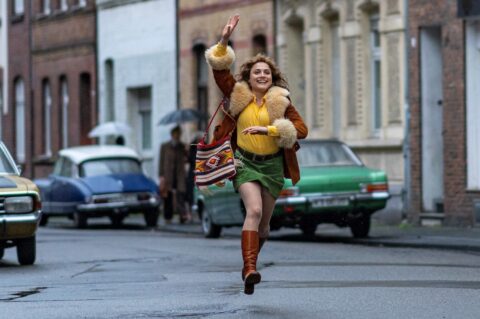Concert promotion is the antithesis of jazz.
Organising a successful show or tour demands meticulous planning and precision — there’s little room for improvisation. Venues need to be secured and musicians must be ready to perform. Yet somehow, a teenager named Vera Brandes pulled off one of the most iconic live performances in jazz history — and one of its bestselling albums — by orchestrating Keith Jarrett’s legendary concert at the Cologne Philharmonic.
Screening in the more commercially-oriented Berlinale Special Gala section, Ido Fluk’s Köln 75 (2025) thrillingly dramatises these events, though it stumbles right out of the gate. After a tense opening where an older Vera is insulted by her father at a party, the film takes a self-conscious detour with a fourth-wall-breaking chat about musicians stopping studio sessions over mistakes. The anecdotes (The Cramps turned abusive, Bob Dylan just laughed) are amusing but feel a bit too “cool” for their own good. Thankfully things improve when we meet teenage Vera (Mala Emde) and the film shifts to a more serious tone.
Emde, who proved her ability to elevate even the corniest material (like the 2020 Antifa drama And Tomorrow the Entire World [Julia von Heinz]) is immediately electric as Vera, even if she doesn’t entirely convince as a teenager. Vera is the type of girl who sneaks out to jazz shows with her super left-wing, beret-wearing best friend Isa (Shirin Lilly Eissa), much to the dismay of her strict dentist father (Ulrich Tukur). One night, she crosses paths with an impressed British jazz musician who asks her to book his German tour. After successfully booking gigs for other artists, Vera sets her sights higher — convincing the director of the Cologne Philharmonic to host a show with the legendary yet struggling Keith Jarrett, as long as she can raise 10,000 Deutschmarks for the deposit.
Fluk takes a bold risk in the second act by shifting focus away from Vera for a large chunk of time, though her presence remains felt. The narrative instead dives into Jarrett’s own struggles — his health issues, dissatisfaction with touring and existential angst. It’s a gamble that pays off, creating a suspenseful counterpoint to Vera’s journey. Even if she manages to pull everything together, it’s unclear whether Jarrett can deliver.
John Magaro is excellent as the troubled genius, capturing the right mix of arrogance, angst and weariness. Eissa, as Vera’s loyal sidekick Isa, is a standout, delivering several deadpan laughs with ease and perfect timing. The entire ensemble seems to be on the same wavelength, making for an engaging little popcorn picture.
Anyone familiar with Keith Jarrett’s work or the general outline of the story will already know that the concert ultimately took place. However, this doesn’t mean that the third act is without its share of suspense. The stakes are incredibly high for everyone involved, particularly for Vera, whose dream of escaping the predictable and mundane life of a dentist is riding on the success of this audacious gamble. As the clock ticks down to the concert, the tension ramps up and the film shifts into a nerve-wracking, high-pressure finale.
It’s one of those exhilarating “mad dash” moments where every second counts, you’re rooting for the underdog and the outcome feels far from certain. Despite knowing the historical result, the film keeps you on edge, reminding you that, sometimes, artistic magic can emerge from the most chaotic, unpredictable circumstances.

Editor-at-large Jared loves movies and lives with Kiki in Berlin.




